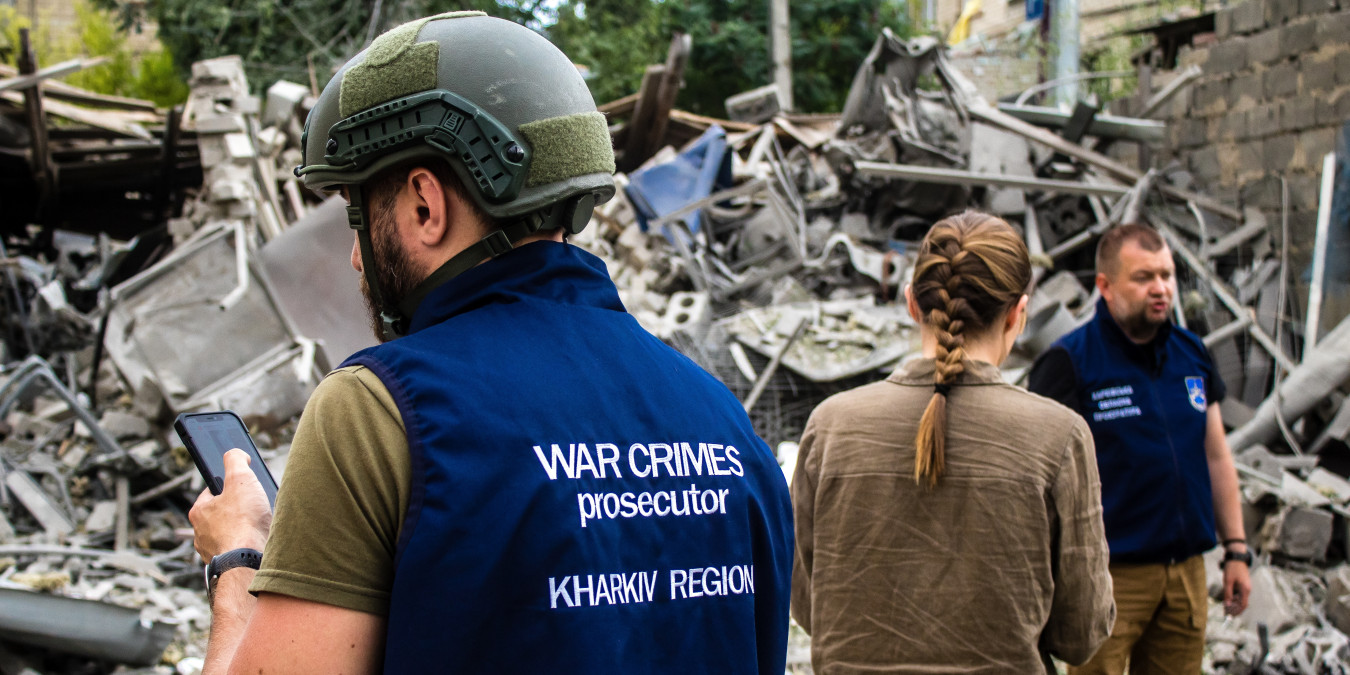The International Criminal Court: Last Hope for Ukraine and Global Justice
Published: Dec 5, 2024 Reading time: 4 minutes Share: Share an articleUkrainians have high hopes for the International Criminal Court (ICC) in The Hague. They view the arrest warrant issued against Russian dictator Vladimir Putin last spring as a significant step toward international justice and supporting the people of Ukraine. Human rights organisations in Ukraine, with the support of People in Need, continue to document the crimes that accompany the Russian invasion systematically. They are following the attacks with concern; according to them, threatening the court's work could jeopardise the investigation.

It was a truly historic decision.
In March 2023, the International Criminal Court (ICC) in The Hague issued an arrest warrant for Russian leader Vladimir Putin and the Kremlin's representative for children's rights, Maria Lvova-Belova. The court initiated their prosecution in connection with the Russian invasion of Ukraine, specifically for the abduction of Ukrainian children from the occupied territories.
"It has never happened before that a court issued an arrest warrant for a leader of one of the five permanent members of the UN Security Council. We believe that this decision destroys the myth of the politicisation and dysfunctionality of the ICC, which is often used in Ukrainian politics as an explanation for the refusal to ratify the Rome Statute," according to a joint statement from Ukrainian human rights organisations associated with the Tribunal for Putin coalition. The Rome Statute, which established the ICC in 2002, was ratified by the Ukrainian parliament in August of this year.
Western countries welcomed Putin's arrest warrant, and it gave hope for justice to Ukrainians resisting Russian aggression. "The International Criminal Court is the 'court of last resort.' It operates on the principle of complementarity with national criminal jurisdictions, meaning it only prosecutes crimes that individual countries do not want or cannot prosecute on their own," Ukrainian human rights activists explain. They also appreciated that the ICC is acting differently in Ukraine than in previous cases and is proceeding much faster. In the past, the ICC usually issued an arrest warrant only after several years of investigation.
We support human rights organisations that document war crimes
Ukrainian human rights organisations, which we support, played a significant role in the ICC's unprecedented decision. From the first hours of Russia's full-scale war against Ukraine, they have been systematically documenting human rights violations and crimes accompanying the invasion. They are collecting evidence and testimonies that should serve as evidence for future international trials against Russia's political and military leadership. We help finance the activities of more than a dozen leading Ukrainian human rights organisations.
Tens of thousands of cases have been documented to date, showing signs of war crimes or crimes against humanity, from attacks on civilians to the abduction of Ukrainian children to Russian territory. The ICC issued Putin's arrest warrant precisely because of the abduction of children.
Will it be easier to prove child abductions?
Kidnappings will probably play a key role in proving guilt. Experts point out that crimes such as murder, rape, or torture during the Russian army's operation in Bucha or Mariupol, can be challenging to prove links to the highest state representatives. On the contrary, establishing a link to the abductions of Ukrainian children from the occupied territories to Russia, where the Russian dictator's signature appears on decrees facilitating their subsequent adoption, should be easier. Ukrainian authorities officially registered 19,546 cases of children who were forcibly transferred or deported to Russia. Authorities consider another two thousand children missing. Russia has returned about four hundred children so far.
The international tribunal's role must be respected
Ukrainians have placed great hope in the ICC as the world's only legitimate permanent international tribunal. They perceive the attacks on the court as a setback. "An arrest warrant issued by the ICC is only one step in implementing international justice; all crimes must be thoroughly investigated. Influencing these processes using political tools is unacceptable. Constant threats and attacks from various actors and states can significantly jeopardise the court's work, especially when investigating the situation in Ukraine," reads a recent statement by the Ukrainian human rights coalition At 5 AM.
People in Need sees the ICC as a key institution for solving the most serious international crimes of genocide, crimes against humanity, and war crimes. Undermining or questioning this role jeopardises the prosecution of such crimes, which ultimately means that such acts would be tolerated and condoned, and thousands of victims would never see justice.



